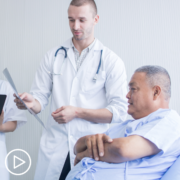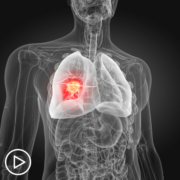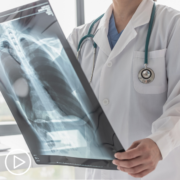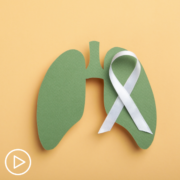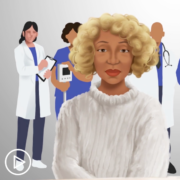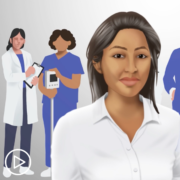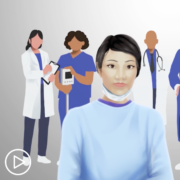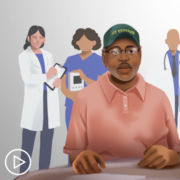How Small Cell Lung Cancer Patients Can Best Self-Advocate
How Small Cell Lung Cancer Patients Can Best Self-Advocate from Patient Empowerment Network on Vimeo.
How can small cell lung cancer (SCLC) patients advocate for optimal care? Dr. Rafael Santana-Davila with the University of Washington School of Medicine shares advice for questions to ask your doctor and about the benefits of telehealth and clinical trials.
[ACT]IVATION TIP
“…make sure that you ask several questions to your doctor is, “Can I have access to a second opinion to a sub-specialist in lung cancer? Or have you thought about my case? And is there any availability of clinical trials here or in other centers?”
See More from [ACT]IVATED Small Cell Lung Cancer (SCLC)
Related Resources:

|

|

Advice for Small Cell Lung Cancer Patients Considering Clinical Trials |
Transcript:
Lisa Hatfield:
So one of your areas of research is studying how small cell lung cancer patients in the general population, those who don’t have access to cancer centers, are treated in order to figure out how to best bring the most recent advances in care to these individuals. Can you share with us some recent findings or learnings from your research, and how can these patients maybe best advocate for themselves?
Rafael Santana-Davila:
Medicine is a team sport. And this is also especially true for cancer. And the difference that…when I see patients, I tell them that it’s not that I’m smarter than the community oncologist. I’m not. The difference that I have with community oncologists is that I’m a sub-specialist. So who I treat are patients who have cancers of the chest or the head and neck. That means that I dedicated my career to treating those patients. And if you ask me questions about lung cancer or head and neck cancers, we can talk forever. But I’m no longer a specialist in treating all other cancers. Community oncologists don’t have that luxury.
So I do think that it’s very important for patients to get a second opinion, to have access to a major cancer center so that they can be sure that the plan of treatment is something that is the top of the line, the best treatment that is available. And they also ask about clinical trials, because there’s clinical trials out there that are moving the needle forward, and participation of those clinical trials is something that is very important. So having an opinion by somebody that, again, treats only lung cancers is very important. Now, the only thing good that COVID had was that it led to telehealth.
So nowadays I can see patients…I work in Seattle, so I can see patients that live across the state and in the farmland where they don’t have access to an academic medical center also to a sub-specialty, but I can see them through telehealth and I can…in the majority of cases, I say, “Yes, your doctor at home has a good plan. Let’s treat you with that.” Or I give some tips or tricks to the community oncologists, or I offer the latest and greatest in clinical trials and patients can make that decision at that point.
So the activation tip for this is make sure that you ask several questions to your doctor is, “Can I have access to a second opinion to a sub-specialist in lung cancer? Or have you thought about my case? And is there any availability of clinical trials here or in other centers?” That’s what I would tell patients. And patients need to be the best advocates for themselves and they are. They know that they’re going through a very rough time, but they just need to say, “What else can I do for this?”
Lisa Hatfield:
Great, thank you so much for that. And as a cancer patient myself and a patient advocate, I fiercely advocate for patients to always, if you get a cancer diagnosis, if you can, consult with somebody who is a specialist or a sub-specialist in the type of cancer you have. It can make a difference for you.
Rafael Santana-Davila:
I agree. And, again, with the era of telehealth, that has opened the ability for this.
Share Your Feedback:
Create your own user feedback survey


